Breastfeeding shock: Mother's milk could make children OBESE growing up
MOTHER's milk can increase the chances of a child growing up obese - suggesting that breast is not always best, research has shown.

Levels of a natural component found in breast milk plays a role in a child's weight, experts say.
Previous studies found children fed on breast milk were less likely to have excessive body fat or be obese than those given formula.
Now it is believed that the composition of a mother's milk is more important than predicting childhood obesity than the mother's weight and her weight gain in pregnancy.
The study found that complex carbohydrates called human milk oligosaccharides (HMOs), which are found in breast milk, can lead to fat gain.
American researchers found that higher levels of HMOs were linked to fatter babies.
But higher concentrations of another kind of HMOs were linked to less fat.
While obese mums are at greater risk of having overweight kids, scientists were unsure about how fatness is transmitted.

While genetics play a role in HMO composition, scientists do not yet know what contributes to a variation in the composition of breast milk.
It is likely that a mother's diet may influence levels of HMOs, but this has not yet been studied.
Dr Tanya Alderete, of the Keck School of Medicine at the University of Southern California, said: "At six months of age, higher breast milk levels of LNFPII and DSLNT were each associated with approximately one pound of greater fat mass.
"Other HMOs were protective at six months.
Charity Helping To Save The Life Of Obese Baby
"Increased amounts of a HMO called LNFPI in breast milk was associated with about a one pound lower infant weight and fat mass."
Professor Michael Goran, of the school's Childhood Obesity Research Centre, added: "Early life experiences related to the environment and different feeding modalities contribute to obesity.
Increased amounts of a HMO called LNFPI in breast milk was associated with about a one pound lower infant weight and fat mass
"But typically we think of obesity risk kicking in after weaning - the timing of introduction to solid foods, early exposures to sugary beverages.
"Clearly there is something going on before weaning even in babies who are exclusively breastfed."
Childhood obesity has more than doubled and has quadrupled in teenagers in the past 30 years.
Latest statistics show that around 28% of children aged 2 to 15 are classed as either overweight or obese in England.


The study examined 25 mothers and babies and looked at breast milk and infant weights at ages one and six months.
Some babies may have been introduced to solid food, which would have contributed to growth and body composition.
Prof Goran added: "Ultimately what we would like to be able to do is identify which of the HMOs are most important for obesity protection and then use that as a supplement that can be given to the breastfeeding infant and added to infant formulae."
Current infant formula does not contain any HMOs.
HMOs are known to play a role in helping to develop the infant immune system too.
The study was published online by The American Journal of Clinical Nutrition.


